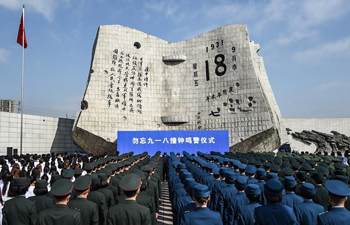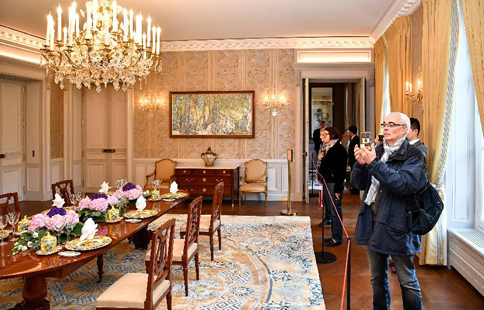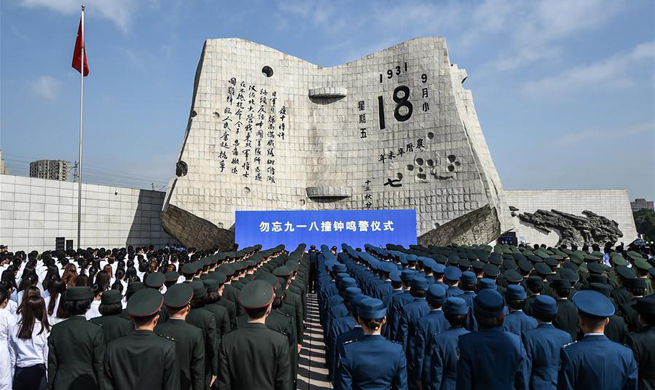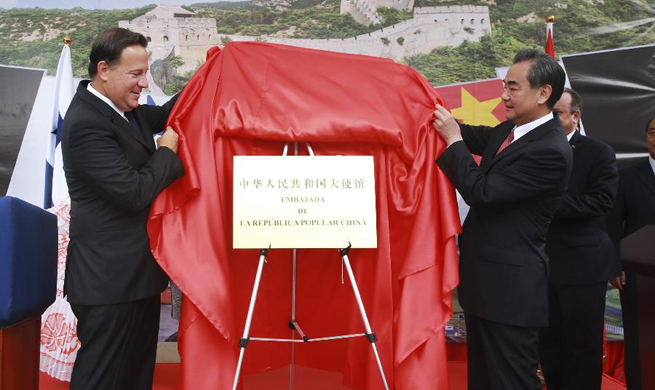RAMALLAH, Sept. 18 (Xinhua) -- Palestinian observers considered the announcement of Hamas movement to dissolve its administrative committee in the Gaza Strip widely opens the door to Palestinian reconciliation.
Meanwhile, several major dispute files between Hamas and rival President Mahmoud Abbas' Fatah movement reduce the level of expectations for reconciliation, which requires the pressure of the Egyptian mediator, observers told Xinhua in recent statements.
Hamas announced in a statement Sunday dissolving its administrative committee in the Gaza Strip and called on the Palestinian consensus government to "carry out its duties immediately in the Gaza Strip and to hold general elections."
The Hamas statement came while a delegation of its leadership, headed by its chief Ismail Haniyeh, and another delegation of Fatah, headed by member of its central committee Azzam al-Ahmad, are in Cairo for discussion of efforts to achieve Palestinian reconciliation ending the internal split since mid-2007.
Hamas's position was cautiously welcomed by Fatah movement which said that a bilateral meeting with Hamas will be held, followed by a meeting of all the Palestinian factions signed the reconciliation agreement in 2011 to "start practical steps to implement the agreement in all its articles."
For his part, President Abbas expressed satisfaction with the agreement reached by Egyptian efforts, enabling the consensus government to carry out its duties in the Gaza Strip, and to hold presidential and legislative elections.
Abbas added in a statement that he will hold a meeting for Palestinian leadership upon his return to the Palestinian territories from meetings of the UN General Assembly in New York.
Several months ago, Hamas bloc in Palestinian Legislative Council approved to form a "high committee" to administer the Gaza Strip and announced that it will end its work when the consensus government, formed under Palestinian agreement mid of 2014, runs the besieged coastal enclave.
In response, President Abbas has taken "punitive measures" against Gaza in April by reducing the salaries of PA civil servants in the Gaza Strip and sending 7,000 of them to early retirement, in addition to reducing the fund of basic services in the strip.
Political analyst and writer from Ramallah, Hani al-Masri, said it is a positive and crucial development that Hamas announced to disband the administrative committee, and Fatah, following announcement, would open a bilateral dialogue to achieve reconciliation under Egyptian auspices.
However, al-Masri also warns that "bitter former experience has taught us not to sink into optimism because the causes of split are multiple and deeply rooted in the conflicting rival parties in both Gaza and the West Bank."
Palestinian dialogue should address all issues of disagreement as a single package under Palestinian and Arab auspices, a binding implementation mechanism and a timetable agreed upon based on partnership, including the formation of a national power-sharing government, al-Masri stressed.
Both Fatah and Hamas have reached a number of bilateral and other understandings within a comprehensive framework for the Palestinian factions, but have failed to put an end to the ongoing internal division since mid-2007 and restore the desired unity between the West Bank and the Gaza Strip.
In the same context, the writer and political analyst from Gaza, Adnan Abu Amer, agreed with al-Masri that the Hamas pledge to dissolve administrative committee in the Gaza Strip is "a step in the right direction," stressing that the challenges remain, in light of many unresolved questions about the near future for reconciliation talks.
Abu Amer added that "Hamas' move took the ball to the court of President Abbas and Fatah movement and pressure them to take measures to support reconciliation efforts, especially retracting punitive measures taken against the Gaza Strip for several months."
The internal Palestinian fragmentation began after the Hamas takeover of the Gaza Strip by force after rounds of internal fighting with forces loyal to the Palestinian Authority.
At the time, President Abbas dismissed the national unity government, which was a problem between Hamas and Fatah, headed by Haniyeh, but Hamas rejected the decision and kept a government that runs the strip.
The consensus government then continued to accuse Hamas of not allowing it to carry out its duties in the coastal enclave, as well as keeping a shadow government under "Hamas" administration.
Meanwhile, Hamas complained of the government "negligence" for its responsibilities in the strip, especially the salaries of staff appointed during the years of division.
Political science professor at Al-Azhar University in Gaza, Naji Shurab, said that Hamas' position is a very important political step, but he emphasized that achieving serious Palestinian reconciliation" should not only include solutions to issue of dissolution of administrative committee in Gaza, but they are much deeper, as there is still a gap in both Hamas and Fatah positions and demands.
Shurab said that "PA is required to immediately stop punitive measures taken against Gaza and to agree on reconciliation, as well as to agree on the Palestinian options to work on Palestinian political reconstruction, as it is the only way to strengthen the Palestinian position and get out of the current crisis."

















